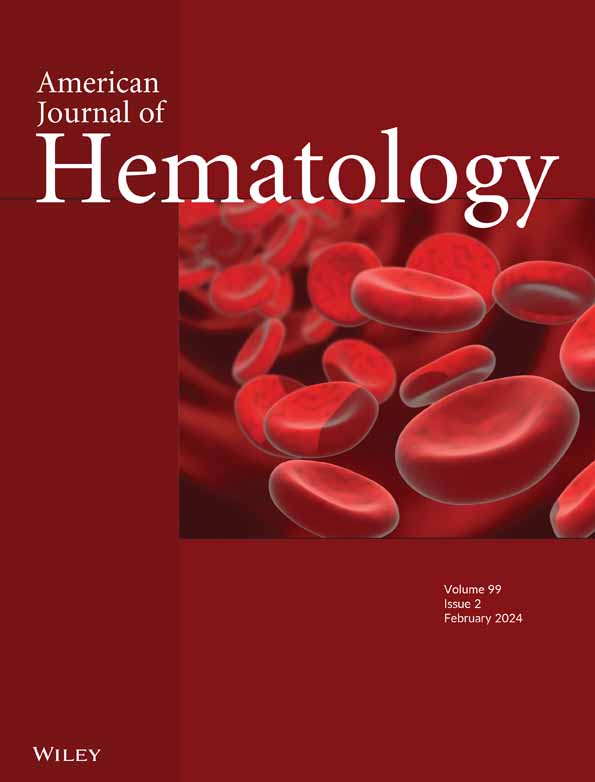异基因造血干细胞移植后Hetrombopag与血小板生成素促进血小板植入的有效性和安全性:一项前瞻性、多中心、随机对照临床试验
IF 9.9
1区 医学
Q1 HEMATOLOGY
引用次数: 0
摘要
同种异体造血干细胞移植(allo - HSCT)是治疗血液系统恶性肿瘤的关键,但面临血小板植入延迟、移植物功能差(PGF)和出血风险的挑战。Hetrombopag,一种血小板生成素受体激动剂,被评估为促进移植后血小板恢复。接受同种异体造血干细胞移植的患者在输注后第3天随机分为低剂量(2.5 mg/天)、高剂量(5mg /天)血小板组,或接受血小板生成素(300 U/kg/天)治疗的对照组。终点包括血小板/中性粒细胞植入时间、PGF发生率、输血需求和安全性。在分析的212例患者中,血小板植入hetrombopag组(中位13天)比对照组(15天;P = 0.001),无剂量依赖性差异(P = 0.821)。中性粒细胞的植入也加快了(13天和15天;P = 0.002)。血小板组PGF发生率(5.04%)低于对照组(13.7%;P = 0.042)。实验组需要较少的血小板输注(p = 0.021),胃肠道出血减少,费用更低。继发性血小板恢复失败组间无差异。Hetrombopag安全地加速血小板和中性粒细胞的植入,降低PGF的风险,并减少输血依赖性。低剂量hetrombopag显示出与高剂量相当的疗效,为改善移植结果提供了一种具有成本效益的策略。试验注册:ChiCTR2200057764。本文章由计算机程序翻译,如有差异,请以英文原文为准。
Efficacy and Safety of Hetrombopag Versus Thrombopoietin in Promoting Platelet Engraftment After Allogeneic Hematopoietic Stem Cell Transplantation: A Prospective, Multicenter, Randomized Controlled Clinical Trial
Allogeneic hematopoietic stem cell transplantation (allo‐HSCT) is pivotal for hematological malignancies but faces challenges in delayed platelet engraftment, poor graft function (PGF), and bleeding risks. Hetrombopag, a thrombopoietin receptor agonist, was evaluated to enhance platelet recovery posttransplant. Patients undergoing allo‐HSCT were randomized on Day 3 Post‐Infusion into low‐dose (2.5 mg/day), high‐dose (5 mg/day) hetrombopag groups, or a control group receiving thrombopoietin (300 U/kg/day). Endpoints included platelet/neutrophil engraftment time, PGF incidence, transfusion needs, and safety. Among 212 analyzed patients, platelet engraftment was faster in hetrombopag groups (median 13 days) versus controls (15 days; p = 0.001), with no dose‐dependent difference (p = 0.821). Neutrophil engraftment was also accelerated (13 vs. 15 days; p = 0.002). PGF incidence was lower in hetrombopag groups (5.04%) versus controls (13.7%; p = 0.042). The experimental group required fewer platelet transfusions (p = 0.021), had reduced gastrointestinal bleeding, and lower costs. Secondary platelet recovery failure showed no intergroup differences. Hetrombopag safely accelerates platelet and neutrophil engraftment, reduces PGF risk, and decreases transfusion dependency post‐allo‐HSCT. Low‐dose hetrombopag demonstrated efficacy equivalent to high‐dose, offering a cost‐effective strategy to improve transplant outcomes.Trial Registration: ChiCTR2200057764.
求助全文
通过发布文献求助,成功后即可免费获取论文全文。
去求助
来源期刊
CiteScore
15.70
自引率
3.90%
发文量
363
审稿时长
3-6 weeks
期刊介绍:
The American Journal of Hematology offers extensive coverage of experimental and clinical aspects of blood diseases in humans and animal models. The journal publishes original contributions in both non-malignant and malignant hematological diseases, encompassing clinical and basic studies in areas such as hemostasis, thrombosis, immunology, blood banking, and stem cell biology. Clinical translational reports highlighting innovative therapeutic approaches for the diagnosis and treatment of hematological diseases are actively encouraged.The American Journal of Hematology features regular original laboratory and clinical research articles, brief research reports, critical reviews, images in hematology, as well as letters and correspondence.

 求助内容:
求助内容: 应助结果提醒方式:
应助结果提醒方式:


